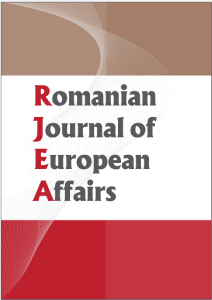Ediţia de toamnă a Romanian Journal of European Affairs analizează subiecte referitoare la: contribuţia adusă de UE la arhitectura guvernanţei globale, influenţa potenţială a Preşedinţiei Consiliului UE asupra opiniei publice, mobilitatea imigranţilor români în Spania, politica externă multi-vectorială a Turciei şi câteva particularităţi ale dezvoltării exporturilor din ţările membre UE şi din Armenia.
The Power of a Single Voice: the EU’s Contribution to Global Governance Architecture
Ana Postolache
Abstract:
Over the past decades, global governance has become the most active phenomenon of world politics. From economics to politics, from climate change to international security, global governance became responsible for adjusting the international life in the name of the common good, relying on the power and the influence of the global key players. The aim of this paper is to assess the EU’s contribution to global governance architecture by analyzing the strengths of the EU approach with regard to global governance issues. Firstly, I will analyze the European Union ability to use its monolithic power and its key elements to influence the variables of global governance architecture. Put simply, the analysis looks at the internal governance system of the European Union and its analogue reflections for the global governance system. Secondly, I will limit my attention to three key areas of global governance, and I will adopt an analytical approach to identify and explore the EU practices with regard to: world trade, climate change and international security. In the end, I will discuss the EU performance power to act with a single voice on the entire spectrum of global governance.
Keywords: environmental governance, European Union, global governance, global power, international security, world trade
The Influence of the EU Council Presidency on Public Opinion
Petr Kaniok
Abstract:
The Presidency of the EU Council is regarded as an influential and useful instrument for domestic political progress of European integration and the issues it brings along. Many academics as well as politicians assume that the EU Council Presidency, which allows any country to be at the centre of European and world media attention for six months, therefore represents a strong potential for domestic socialization. This article investigates that idea at the level of public, analyzing several EU Council presidencies, and the potential impact of these presidencies on the voters’ attitudes in the Presidency holding countries on key aspects of the EU. The text’s hypothesis refers to the supposition that the EU Presidency in its present form has a positive influence on the support of citizens for European integration and improvement of their information level on the EU.
Keywords: enlargement of the European Union, EU Council Presidency, European Constitution, European integration, public support for EU membership
Living across the Borders: The Mobility Narratives of Romanian Immigrants in Spain
Silvia Marcu
Abstract:
This article seeks to analyze the mobility of Romanians within Spain, taking into account the current economic crisis that is affecting labour markets in Spain and Romania, and its impact upon people. Using the perceptions of Romanians, the paper examines their experiences and their understanding of their process of mobility and return as Europeans who have a right to free circulation but limited working rights in the enlarged European Union (EU). To carry out this research, the author used the qualitative method of in-depth interviews with 80 Romanian immigrants engaged in labour mobility between the two countries. The article highlights the role played by borders in studies of mobility and suggests that migrants may have varying perceptions concerning place and mobility. By looking at immigrants’ narratives the article seeks to produce a framework that reflects the transformation of immigrants into mobile citizens within the context of the EU.
Keywords: European Union, immigrants, labour, mobility, Romania, Spain
Competing Variables in Turkey’s Multi-Vector Foreign Policy
Agnes Nicolescu
Abstract:
A certain shift in the Turkish foreign policy has been noticeable over the last decade, especially after the AKP (Justice and Development Party) came to power in 2002, which manifested in closer relations with its Arab neighbours and simultaneously a more aggressive stance towards Israel. These developments have led many researchers to say that Turkey’s activism in the Middle East represents its return towards the East, at the expense of its Europeanisation aspirations. The current research paper aims to study the validity of this claim by looking at different sets of interactions between Turkey and its neighbours, through a constructivist lens of competing yet complementary variables.
The ascending multilateralism manifested in Turkey’s foreign policy discourse and initiatives has been interpreted by some (Reynolds 2012) as a consequence of the exhaustion of the Kemalist project, while others (vom Hau et al 2012) see it as the logical result of the complex internal and external interactions of modernisation and globalisation at the level of the Turkish society. The conceptual categories proposed for assessing Turkey’s conduct in relation to other states open up perspectives for exploring further cooperation interactions between Turkey and the EU, on the one hand, and with countries in their shared neighbourhood as well.
Keywords: Arab Spring, functionalist approach, identity, multi-vector policy, opportunity seeking, regional actor
Study of the Peculiarities of Export Developments in EU Member Countries and in Armenia
Karen Grigoryan
Abstract:
This paper aims at investigating the role of integration and trade in the economic development of EU member countries and Armenia, which is one of the six countries of EU Eastern Partnership project. Building on the studies of comparative advantages and peculiarities of the inter and intra – trade of the various countries, the paper provides a general description of export developments and other related factors affecting economic developments in EU member countries, as well as Armenia durind the last two decades, especially before and after the world financial-economic crisis. Special attention is paid to both – developed and developing EU member states. This study theoretically and empirically examines various problems in the export structure of the countries and key elements of export development strategy recommended.
Keywords: Armenia, comparative advantages, EU developed and developing countries, EU Eastern Partnership, European integration, export, inter and intra-trade






